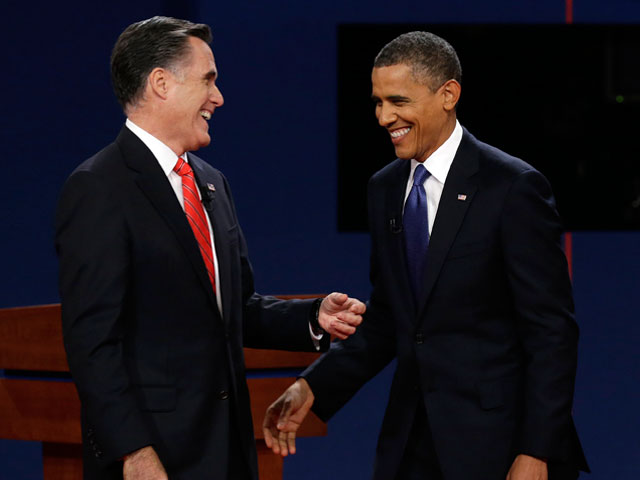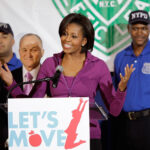On October 3, 2012, Republican candidate, Mitt Romney and President Barack Obama engaged in their first of three televised debates. Held at the University of Denver in Colorado, the debate was moderated by Jim Lehrer. The debate was divided into six sections of fifteen minutes each, allowing each candidate a two minute opening statement to each question followed by an open discussion. Thousands of people submitted their ideas for topics and questions, but Lehrer made final selections.

The First Debate
Question One: The Economy--“What are the major differences between the two of you and how would you go about creating new jobs?”
President Obama talked about the financial crisis four years ago, and how, through the hard work of the American people, the private sector has created 5 million new jobs. He spoke of the auto industry’s improvements and a rising housing market. He believes the United States should invest in education and training, new sources of energy, reforming the tax code, and winding down two wars.
Governor Romney presented his five-part plan to take the American people on a different path. He talked about decreasing America’s dependance on foreign energy sources, opening up more trade and competing more strongly with China’s growing industry, making sure we have the best schools, balancing the budget, and championing small business. He wants tax relief for those in the middle class.
Question Two: The Economy, Part 2--“What are the differences in how you’d go about tackling the deficit?”
Romney said it was not moral for his generation to keep spending more money than it earns. He said he would lower government spending and encourage economic growth. He will cut all programs that weren’t determined to be critically important. He will cut Obama’s health care reforms, and well as funding to any programs that could be more effectively run at the state level–such as the Public Broadcasting System (PBS).
Obama said he began his presidential term four years ago with a looming debt and fear of severe economic problems. His administration cut out seventy-seven programs to lower spending, went after Medicare fraud aggressively, and worked to cut out $ 1 trillion of discretionary domestic spending. He offered a $4 trillion reduction plan that asks for one dollar of revenue for every $2.50 spent.
Both candidates talked about their opinion of the Simpson-Bowles legislative plan, also known as the National Commission on Fiscal Responsibility and Reform.
Question Three: The Economy, Part 3--”What are the major differences in how you’d deal with Entitlements (Social Security, Medicaid and Medicare)?”
Both candidates were in some agreement on the best way to deal with Social Security and Medicaid funding problems. Where the candidates differed was on the issue of Medicare.
President Obama said he does not support a voucher program because he believes that the primary recipients are the insurance companies. He also believes that, over time, such a system would make the Medicare system collapse.
Governor Romney said he would not make any changes to current retirees. He said he would allow the nation’s senior citizens the choice to use Medicare or another company.
When asked to respond to the level of federal oversight in these types of programs, Romney said that regulation was essential, but believes the Dodd-Frank bill that tried to address regulation was excessive. Obama responded that the measure was in response to a crisis caused by reckless behavior.
Question Four: Healthcare--”What are the major differences in how you view the subject of healthcare?”
Romney has promised to repeal Obama’s health care reforms very soon upon becoming president. He said the laws would eventually take money away from Medicare. He claims the Congressional Budget Office said it would cost the American people $2,500 a year more than a traditional policy.
Obama said that the Affordable Care Act (sometimes called Obamacare) was designed to lower the high costs of healthcare and to help families that worried about becoming bankrupt if someone got sick. It doesn’t mean that people can’t keep their own insurance, but is set up like a group plan.
Question Five: Role of the Government--”What are the fundamental differences on how you view the role of the federal government?”
Obama said the role of government is to keep the country safe. He believes government has the capacity to create ladders of opportunity and that the genius of America is the free enterprise system. He referenced President Lincoln’s belief that we can do great things together. He wants to see 100,000 new teachers in schools.
Romney said the role of the government is to promote and protect the Declaration of Independence. This means maintaining the strength of the military, maintaining a commitment to religious tolerance, and the right to pursue dreams. To do so, he believes it is time for a new path.
Question Six: Governing--”How would you deal with partisan gridlock?”
Romney said he was elected governor of Massachusetts, his legislature was 87% Democrat. Because of that, he had to work “across the aisle,” not compromising on principals, but finding common ground both political parties could be happy with. Romney said he wanted to run for president because people are hurting and that there is a need for leadership in Washington.
Obama said that you take ideas from anyone (meaning any political party’s set of beliefs) as long as it provides more opportunity. He reminded people that he signed three trade deals, and is ending two wars in Afghanistan and Iraq. Obama said that being a leader means having a plan and occasionally saying no, something he said his opponent hasn’t done.


